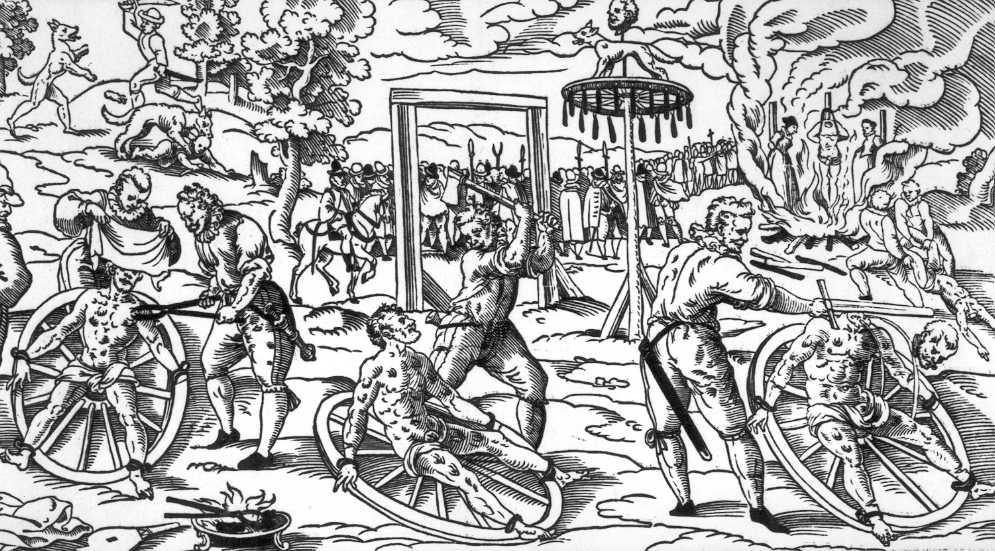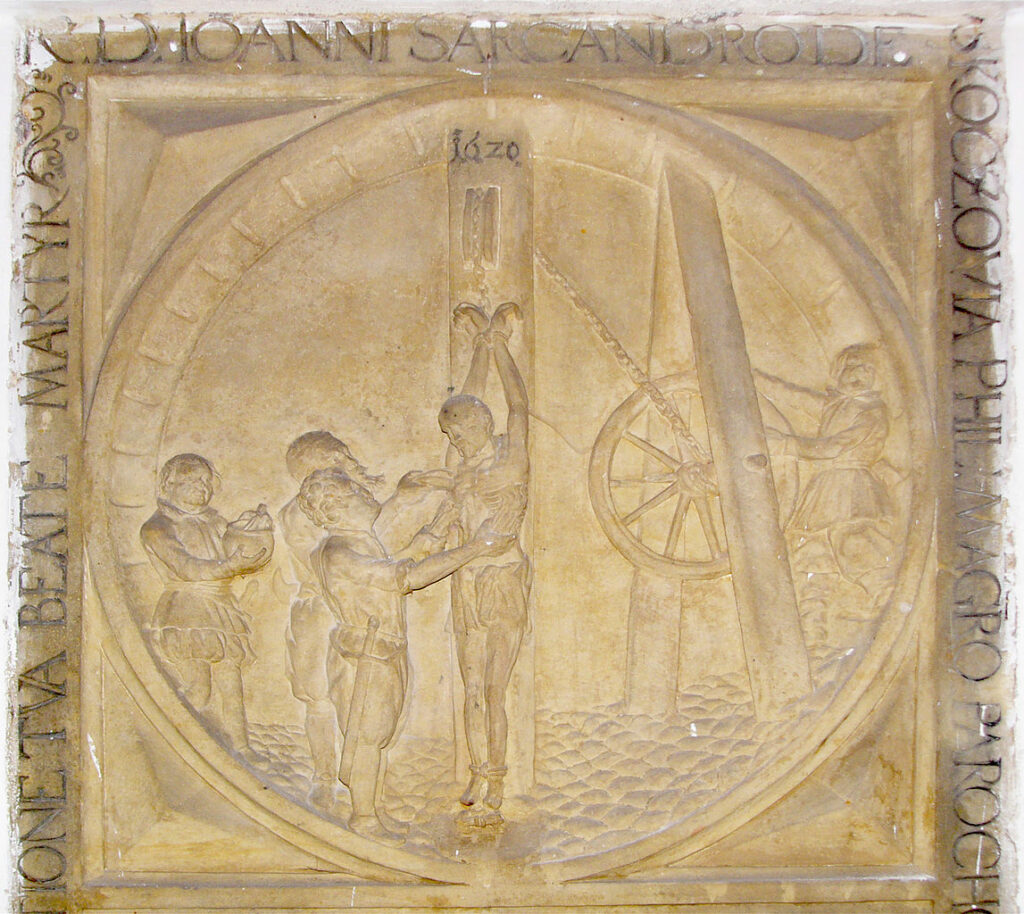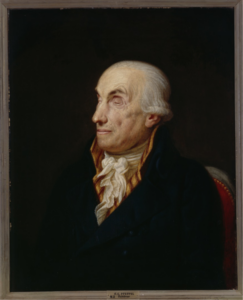The parricide
(Poet's title: Der Vatermörder)
Set by Schubert:
D 10
[December 26, 1811]
Ein Vater starb von des Sohnes Hand.
Kein Wolf, kein Tiger, nein,
Der Mensch allein, der Tiere Fürst, erfand
Den Vatermord allein.
Der Täter floh, um dem Gericht
Sein Opfer zu entziehn,
In einen Wald. Doch konnt’ er nicht
Den innern Richter fliehn.
Verzehrt und hager, stumm und bleich,
Mit Lumpen angetan,
Dem Dämon der Verzweiflung gleich,
Traf ihn ein Häscher an.
Voll Grimm zerstörte der Barbar
Ein Nest mit einem Stein,
Und mordete die kleine Schar
Der armen Vögelein.
Halt ein! rief ihm der Scherge zu,
Verruchter Bösewicht,
Mit welchem Rechte marterst du
Die frommen Tierchen so?
Was fromm, sprach jener, den die Wut
Kaum hörbar stammeln ließ;
Ich tat es, weil die Höllenbrut
Mich Vatermörder hieß.
Der Mann beschaut ihn; seine Tat
Verrät sein irrer Blick.
Er fasst den Mörder, und das Rad
Bestraft sein Bubenstück.
Du, heiliges Gewissen, bist
Der Tugend letzter Freund;
Ein schreckliches Triumphlied ist
Dein Donner ihrem Feind.
A father died at the hand of his son.
It was not a wolf or a tiger.
It was simply a human, that prince of animals, who invented
Parricide on his own.
Having done it, he fled from justice;
He wanted to evade responsibility for the sacrifice.
In a wood he found that he could not
Flee from the judge within.
Languishing and gaunt, silent and pale,
Dressed in rags,
Like a demon of despair,
He was met by an enforcer.
Full of fury, the barbarian destroyed
A nest with a stone
And murdered the small litter
Of poor little birds.
‘Stop it!’ shouted the bailiff,
‘Dreadful villain!
What right do you have to torment
The gentle little creatures like that?’
‘What do you mean, gentle?’ he said, fury
Making him stammer almost inaudibly,
‘I did it because this brood from Hell
Called me a parricide.’
The man looked at him, his deed
Betrayed by his crazy look.
He arrested the murderer, and the wheel
Punished his knavery.
You, sacred conscience, you are
Virtue’s last friend.
A terrible song of triumph
Is how her enemy hears your thunder.
All translations into English that appear on this website, unless otherwise stated, are by Malcolm Wren. You are free to use them on condition that you acknowledge Malcolm Wren as the translator and schubertsong.uk as the source. Unless otherwise stated, the comments and essays that appear after the texts and translations are by Malcolm Wren and are © Copyright.
☙
Themes and images in this text:
Birds Father and child Fleeing Murder Songs of triumph Thunder and lightning Woods – large woods and forests (Wald)
According to Freud’s theory of the Oedipus Complex, it is the most natural thing in the world for sons both to desire to kill their fathers and to recoil in horror at the suggestion that this is what they would like to do. Society condemns parricide as unnatural simply because it is what nature craves. We have to keep a lid on the id.
In this story the murderous son tries to escape from the world of culture into the world of nature only to find that civilisation and its discontents have followed him. Even the innocent fledglings in their nest cry out denouncing his guilt. His attempt to silence them (again through violence) is a sign that the inner voice of conscience is louder than anything else.
The figure of authority who challenges him is a curiously ambivalent character. He is called both a Häscher and a Scherge. This could be a plain thug. Outside a nightclub he would be a bouncer. In the Wild West he would have been the sherriff. One of the heavies. He represents the threat of violence which is necessary to prevent violence.
In this case, he has arrived too late. The crime cannot be prevented so it must be punished. The murdering son is dealt with on the wheel (or is it the rack, with the wheel being used to pull rather than break the perpetrator?). The cycle of violence continues.

Staats- Stadtbibliothek, Augsburg.

Photo: Michal Maňas
☙
Original Spelling and notes on the text Der Vatermörder Ein Vater starb von des1 Sohnes Hand. Kein Wolf, kein Tyger, nein! Der Mensch allein2, der Thiere Fürst, erfand Den Vatermord allein. Der Thäter floh, um dem Gericht Sein Opfer zu entziehn, In einen Wald; doch konnt' er nicht Den innern Richter fliehn. Verzehrt, und hager, stumm und bleich, Mit Lumpen angethan, Dem Dämon der Verzweiflung gleich, Traf ihn ein Häscher an. Voll Grimm zerstörte der Barbar Ein Nest mit einem Stein, Und mordete die kleine Schaar Der armen Vögelein. Halt ein! rief ihm der Scherge zu, Verruchter Bösewicht3! Mit welchem Rechte marterst du Die frommen Tierchen so? Was fromm, sprach jener, den die Wuth Kaum hörbar stammeln ließ; Ich that es, weil die Höllenbrut Mich Vatermörder hieß. Der Mann beschaut ihn; seine That Verräth sein irrer Blick. Er faßt den Mörder, und das Rad Bestraft sein Bubenstück. Du, heiliges Gewissen, bist Der Tugend letzter Freund. Ein schreckliches Triumphlied ist Dein Donner ihrem Feind. 1 Schubert inserted the word 'des' here (so 'his son's' not 'a son's) 2 Schubert inserted the word 'allein' (simply) here 3 Schubert changed 'Schadenfroh' (gloater) to 'Bösewicht' (villain)
Confirmed by Peter Rastl with Poetische Versuche von Gottlieb Conrad Pfeffel. IV. Theil. Wien. Gedruckt und verlegt bey F. A. Schrämbl. 1802, pages 221-222; with Sammlung deutscher Beyspiele zur Bildung des Stils. Erster Band. Wien, gedruckt mit Johann Thomas Edlen von Trattnerschen Schriften. 1806, pages 58-59; and with Poetische Versuche von Gottlieb Conrad Pfeffel. Sechster Theil. Vierte rechtmäßige, verbesserte und vermehrte Auflage. Tübingen in der J. G. Cotta’schen Buchhandlung. 1802, pages 65-66.
To see an early edition of the text, go to page 58 [64 von 270] here: http://digital.onb.ac.at/OnbViewer/viewer.faces?doc=ABO_%2BZ159651200


